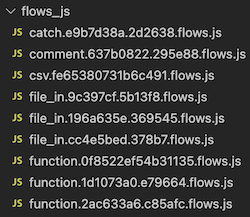node-red-contrib-js-storage 1.0.5
Node-RED storage plugin to store flows as js files for easy readability, code reviews and scans
node-red-contrib-js-storage
Node-RED storage plugin to store flows as .js files for easy readability, code reviews, and scans.
Overview
Node-RED stores flows in a JSON file with dynamic order and stringified code. Inspired by node-red-contrib-yaml-storage plugin, the js-storage plugin takes readability further and splits flows JSON file into individual JavaScript files - valid CommonJS modules that are easy to read, scan, and commit.

Advantages
- JavaScript files have static names (from node type and ID). Re-arranging nodes will not mess up your diffs anymore!
- Function code can be scanned by Sonarqube or other static code analysis tools.
- Function code is editable outside Node-RED (use this feature at own risk).
flows.json(and it's backup file) is still kept updated by default (see configuration). This means you can use them as a backup, for backward compatibility, or for code sharing.
Configuration
The plugin reads the following configuration from settings.js:
storageModule- Required. Must be set to
require('node-red-contrib-js-storage')
- Required. Must be set to
flowDir- Optional. Set to your own directory name for flows.
flowFileReadOnly- Optional. Set to
trueif you want to stop using (or completely remove) flows.json and it's backup file.
- Optional. Set to
Example:
storageModule: require('node-red-contrib-js-storage')
// node-red-contrib-js-storage: The dir containing the flows. If not set, it defaults to <flowFile without extension>_js
flowDir: "flows_js",
// node-red-contrib-js-storage: Prevent updates to flow file. If not set, flow file will be kept updated along JS files in flowDir
flowFileReadOnly: true,
Installation
Locally:
npm install node-red-contrib-js-storage
Globally:
sudo npm install -g node-red-contrib-js-storage
You will also need to modify your settings.js file and add the following:
storageModule: require("node-red-contrib-js-storage");
Usage
On initial load the plugin reads your current flows file in either JSON or YAML format (if you used node-red-contrib-yaml-storage) and converts them on save. Support for initial YAML conversion will be removed in future versions
JavaScript files for deleted nodes (with extension .flows.js) are deleted on Deploy. If you need to restore the previous state from flows json backup file, delete the whole directory.
Example
Original function node code from flows.json:
[
{
"id": "fded463a16684b06",
"type": "function",
"z": "66d84716f9f936a2",
"name": "My function",
"func": "console.log('On message')",
"outputs": 2,
"noerr": 0,
"initialize": "// Code added here will be run once\n// whenever the node is started.\nconsole.log('I am here')",
"finalize": "// Code added here will be run when the\n// node is being stopped or re-deployed.\nconsole.log('I am gone')",
"libs": [],
"x": 540,
"y": 320,
"wires": [[], []],
"info": "# Templates and info\n...are transformed into template literals"
}
]
Transformed file function.fded463a16684b06.flows.js in flows_js directory:
const Node = {
"id": "fded463a16684b06",
"type": "function",
"z": "66d84716f9f936a2",
"name": "My function",
"func": "",
"outputs": 1,
"noerr": 0,
"initialize": "",
"finalize": "",
"libs": [],
"x": 410,
"y": 360,
"wires": [
[]
],
"info": ""
};
Node.info = `
# Templates and info
...are transformed into template literals
`;
Node.initialize = async function (node, msg, RED, context, flow, global, env, util) {
// Code added here will be run once
// whenever the node is started.
console.log("I am here");
};
Node.func = async function (node, msg, RED, context, flow, global, env, util) {
console.log("On message");
};
Node.finalize = async function (node, msg, RED, context, flow, global, env, util) {
// Code added here will be run when the
// node is being stopped or re-deployed.
console.log("I am gone");
};
module.exports = Node;
